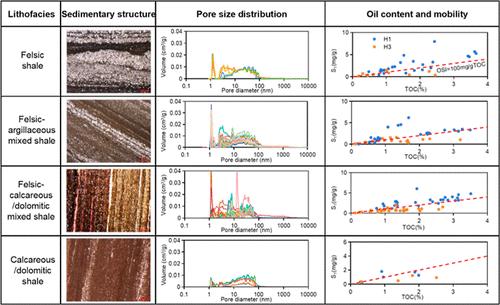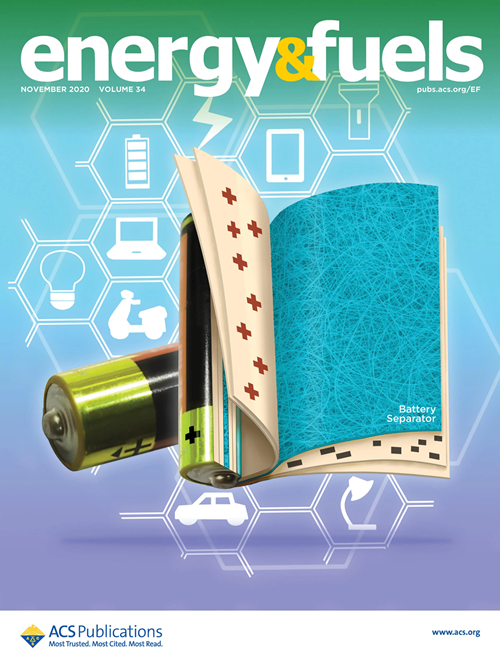Controlling Factors of Shale Oil Enrichment in the Paleogene Funing Formation, Gaoyou Sag, Subei Basin, China
IF 5.2
3区 工程技术
Q2 ENERGY & FUELS
引用次数: 0
Abstract
In light of significant advancements in shale oil exploration within China’s principal oil and gas bearing basins, small to medium-sized basins such as the Subei Basin have also demonstrated considerable potential. However, the complex geological conditions within the Subei Basin present substantial challenges for the identification of favorable strata, thereby hindering large-scale shale oil development. This study utilizes practical exploration data from wells H1 and H3 within the Gaoyou Sag of the Subei Basin, integrating core observations with a suite of sophisticated analytical techniques, including X-ray diffraction, organic geochemistry analysis, argon ion polishing-scanning electron microscopy, nitrogen adsorption-mercury injection capillary pressure, and laser confocal analysis. The primary objective is to elucidate the geological characteristics and controlling factors influencing shale oil enrichment in the second member of the Funing Formation (E1f2) shale. The E1f2 member shale in the Gaoyou Sag exhibits an average total organic carbon content of 1.24% and a mean hydrocarbon generation potential of 5.38 mg/g, with a strong positive correlation observed between these parameters. The mineral composition is markedly heterogeneous, predominantly comprising mixed shale, followed by felsic shale and calcareous/dolomitic shale. The identified pore types include intergranular pores in clay minerals, carbonate intragranular dissolution pores, and a minor proportion of organic matter pores. The shale demonstrates significant vertical variability in oil enrichment, characterized by three source-reservoir couplings: “self-generating and self-reserving”, “mud generating and felsic reserving”, and “mud generating and carbonate reserving”. Formations enriched in carbonates and felsic materials exhibit superior reservoir properties, identified as “sweet spots” due to their enhanced hydrocarbon saturation and mobility. Despite the segmentation resulting from tectonic activities, the impact on preservation conditions remains limited, primarily influencing areas adjacent to sag-controlling faults. Effective preservation conditions are critical for shale oil accumulation and retention. Consequently, the deep sag regions of major depressions in the Subei Basin emerge as prime targets for shale oil exploration, which is pivotal for the efficient development of the E1f2 member shale. This study provides valuable insights into the exploration and development of shale oil within lacustrine faulted basins.

中国苏北盆地高邮下陷古近纪阜宁地层页岩油富集的控制因素
在中国主要含油气盆地页岩油勘探取得重大进展的同时,苏北盆地等中小型盆地也显示出巨大的潜力。然而,苏北盆地内复杂的地质条件给有利地层的识别带来了巨大挑战,从而阻碍了页岩油的大规模开发。本研究利用苏北盆地高邮下陷 H1 和 H3 井的实际勘探数据,将岩心观测结果与 X 射线衍射、有机地球化学分析、氩离子抛光-扫描电子显微镜、氮吸附-汞注入毛细管压力和激光共聚焦分析等一系列复杂的分析技术相结合。主要目的是阐明阜宁地层第二层(E1f2)页岩的地质特征和影响页岩油富集的控制因素。高邮下陷 E1f2 页岩的平均总有机碳含量为 1.24%,平均生烃潜力为 5.38 mg/g,这两个参数之间存在很强的正相关性。矿物成分具有明显的异质性,主要由混合页岩组成,其次是长石页岩和钙质/白云质页岩。已确定的孔隙类型包括粘土矿物中的粒间孔隙、碳酸盐粒内溶解孔隙以及少量有机物孔隙。该页岩的石油富集具有显著的垂直变化性,其特点是三种来源-储层耦合:分别为 "自生自储"、"泥质生油,长岩储油 "和 "泥质生油,碳酸盐储油"。富含碳酸盐岩和长岩物质的地层由于碳氢化合物饱和度和流动性提高,显示出优越的储层特性,被称为 "甜点"。尽管构造活动造成了地层分割,但对保存条件的影响仍然有限,主要影响到下陷控制断层附近的地区。有效的保存条件对于页岩油的积累和保留至关重要。因此,苏北盆地主要凹陷的深陷区成为页岩油勘探的主要目标,这对有效开发 E1f2 成员页岩至关重要。这项研究为湖泊断陷盆地内页岩油的勘探和开发提供了宝贵的见解。
本文章由计算机程序翻译,如有差异,请以英文原文为准。
求助全文
约1分钟内获得全文
求助全文
来源期刊

Energy & Fuels
工程技术-工程:化工
CiteScore
9.20
自引率
13.20%
发文量
1101
审稿时长
2.1 months
期刊介绍:
Energy & Fuels publishes reports of research in the technical area defined by the intersection of the disciplines of chemistry and chemical engineering and the application domain of non-nuclear energy and fuels. This includes research directed at the formation of, exploration for, and production of fossil fuels and biomass; the properties and structure or molecular composition of both raw fuels and refined products; the chemistry involved in the processing and utilization of fuels; fuel cells and their applications; and the analytical and instrumental techniques used in investigations of the foregoing areas.
 求助内容:
求助内容: 应助结果提醒方式:
应助结果提醒方式:


